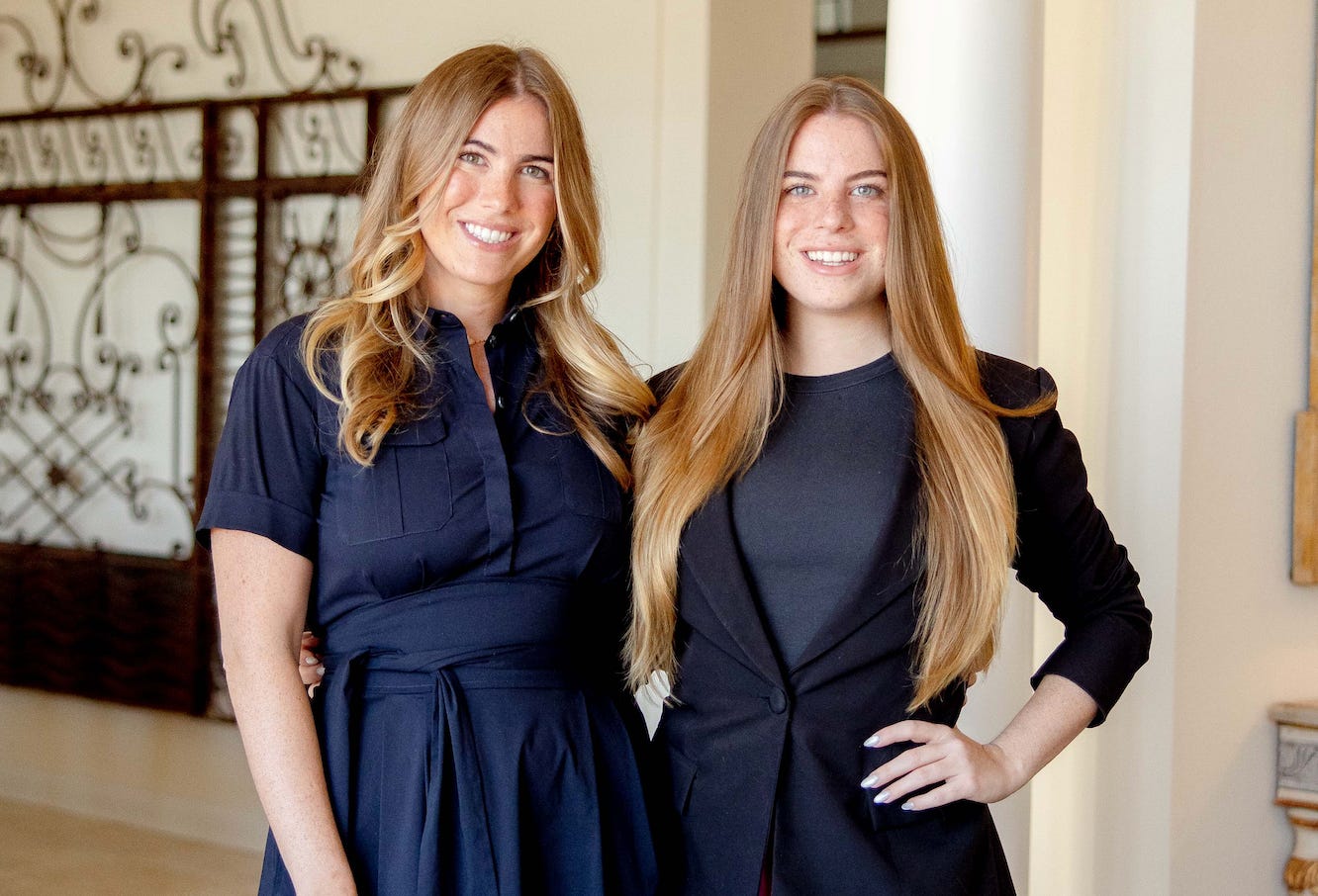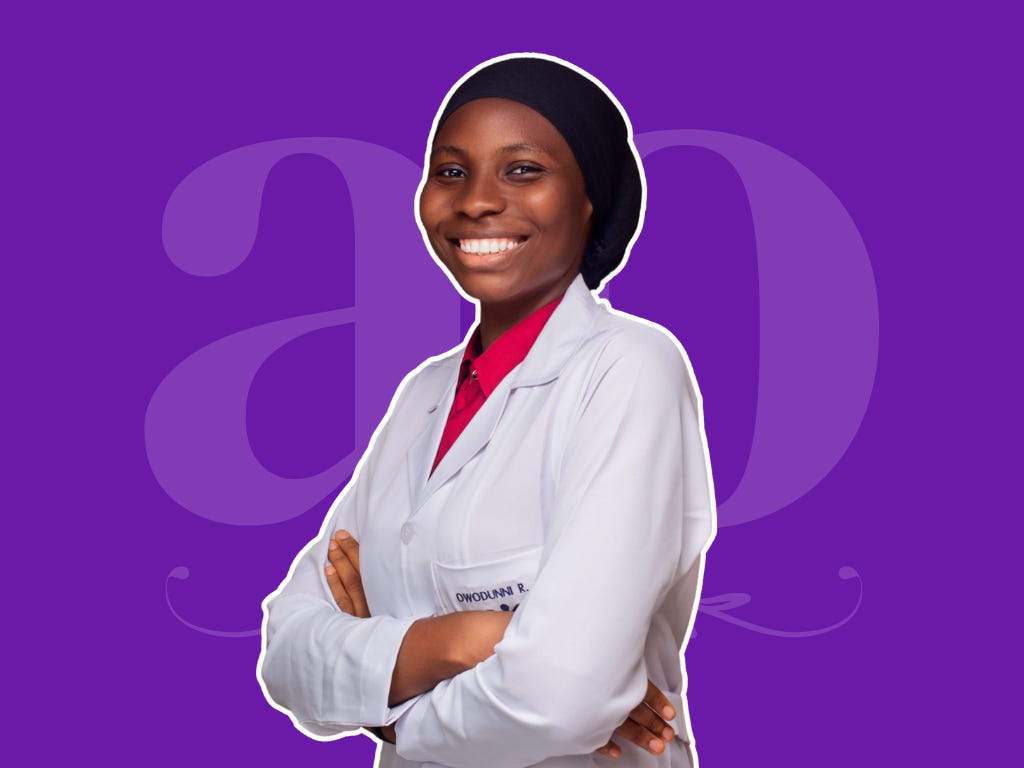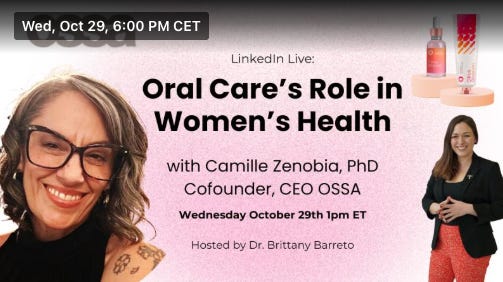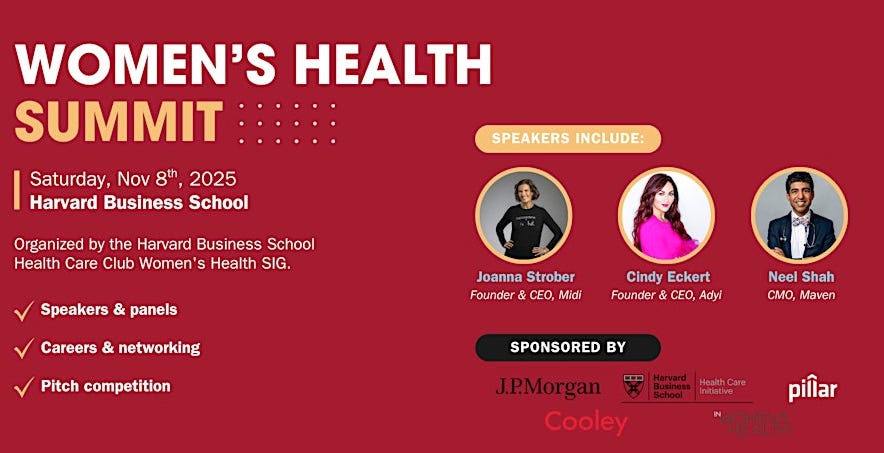💌 Issue 120: SheMed raises $50m | Wisp's migraine support | Why FemTech struggles with healthcare partnerships | Hot flash approval
The global weekly briefing on women's health innovation and FemTech
Welcome to FutureFemHealth, (w/c October 27 2025) — we’re trusted by 8,700 investors, innovators and leaders to decode the funding flows, breakthrough ideas and policy shifts transforming the sector.
🌟 In this week’s briefing:
🏆 UK women’s health platform SheMed raises $50 million Series A
📌 New migraine care vertical for Wisp
🤝 Why FemTech startups struggle with healthcare partnerships
🔥 FDA approves Bayer’s non-hormonal drug for hot flashes
Have news to share or would you like to partner with FutureFemHealth? Let me know at anna@futurefemhealth.com
💬 Why women’s health needs to talk about GLP-1s
Over the past year I’ve sensed a reluctance in women’s health: it’s the idea that drug-based weight loss can’t possibly count as women’s health. Stick with me.
GLP-1s like Ozempic and Wegovy have been dismissed as vanity medicine - “simply” for weight loss. And mostly, weight loss is associated with aesthetics not health. At best, there are a few honest conversations about the link between obesity, fertility, and other health conditions.
The point is, GLP-1s have been left out of most serious women’s health conversations - despite their potential to reshape them.
There’s a growing camp of clinicians who suspect these drugs have enormous potential for conditions like PCOS, menopause, and endometriosis. But we don’t know yet, because clinical evidence is scarce - and that makes it easy to keep ringfencing GLP-1s as “just for weight loss.”
Change is coming.
UK-based SheMed, founded in 2024 by sisters Olivia and Chloe Ferro, this week raised a $50 million Series A for its women’s health platform, which at its core offers GLP-1-based weight management. That figure alone makes it one of the largest raises in women’s health this year and a signal that investors see real potential here (although sidenote - the investors were not disclosed).
SheMed’s model is grounded in clinical oversight with mandatory blood testing before prescribing and medical advisors at every stage.
Beyond this, the Ferro sisters are also using what they learn from their customers to research how these treatments might have benefits that extend past weight loss.
SheMed’s 12-month clinical study is investigating if conditions like PCOS, menopause, and endometriosis may be affected by GLP-1 treatment, potentially through both the weight loss and direct metabolic effects - that’s work that could begin to close real data gaps.
Right now, there’s no robust clinical proof that GLP-1s do benefit women’s health beyond weight management. But this absence of evidence is not evidence of absence - and I don’t think women’s health can afford to ignore what’s coming.
If data within the next year or so confirms benefits for PCOS, menopause and more we could see a big shift in treatment pathways, market opportunities, and how we fundamentally think about women’s health.
Because the future of women’s health won’t be defined by whether we like GLP-1s, or believe they’re “cheating the system.” It will be defined by whether we’re willing to understand the evidence, integrate it into care, and use it wisely.
This week’s poll: where do GLP-1s belong?
Last week’s poll asked: ‘you have $10m to spend in women’s health - where do you spend it?’ Two clear winners on this one - 36% of you said you’d spend on research and 34% of you said diagnostics. Another 23% of you said therapeutics/treatments while just 6% wanted to spend on consumer platforms/apps.
💰 Capital flows: where are investors placing bets?
📌 UK: SheMed raises $50m to scale personalised women’s health for weight loss and clinical research. As we trailed above, SheMed has grown rapidly reaching more than 60,000 members in under a year since launch. Its most well-known programme provides access to GLP-1-based weight management treatments, supported by medical oversight and ongoing digital care. The company is also using these treatments as part of a broader research effort with a clinical study to understand how GLP-1 medications might help manage health conditions such as PCOS, endometriosis and menopause-related symptoms. This large round of new funding shows real investor appetite for GLP-1s and their potential (although investor names have not been disclosed). This funding will be used to expand SheMed’s UK operations, strengthen its medical and technology teams, and improve clinical infrastructure.(Continue reading: FutureFemHealth)
📌 U.S: $5million boost for menopause education. Menopause education is woefully inadequate in medical training - with just 20-30%% of medical programs including it. The Menopause Society has now received a $5 million grant from the Steven & Alexandra Cohen Foundation to expand training for current and next generation healthcare professionals. The philanthropic grant supports NextGen, the Society’s multi-year initiative to improve care for midlife women, which earlier this year also received a $5 million anonymous donation. (Continue reading: The Menopause Society)
🌟 Industry moves and strategic shifts
📌 GLOBAL: Why FemTech startups struggle with healthcare partnerships - a doctor’s perspective. How do you actually get a healthcare professional to recommend your company? In this guest post for FutureFemHealth Dr Ayomide Owodunni shares her insights on why there is a disconnect between FemTech and doctors, and what FemTech companies can do to bridge the gap. (Continue reading: FutureFemHealth)
📌 UK: Hertility launches GYN-AI™ to help cut years-long diagnosis delays in women’s health. Hertility’s patent-pending diagnostic tool uses a million-woman dataset to slash delays from nine years to potentially just seven days. With 98–99% precision across 18 conditions, it aims to support clinicians to act sooner and more accurately. With the NHS in the UK still failing women at scale, this is an innovation that could have real and significant impact. (Continue reading: FutureFemHealth)
📌 EUROPE / U.S: Austria’s Hello Inside launches in the US to tackle women’s metabolic health. Hello Inside says its continuous glucose monitoring (CGM) technology and AI-powered app fills a gap between pharmaceutical-led and lifestyle-based approaches to metabolic health. It aims to help women manage hormones, menopause, and weight through real-time metabolic feedback which encourages lasting behavioral change. The company is already active across European markets and the U.S launch comes amid the rising use of GLP-1 weight-loss drugs. “Our platform shows women in real time how their choices impact their health — crucial for managing weight alongside hormonal changes,” says co-founder Mario Aichlseder. (Continue reading: FutureFemHealth)
📌 U.S: Wisp expands into migraine care, offering asynchronous consults and medication access. Migraines affect around one in five women and occur nearly three times as often in women as in men. Wisp’s new migraine vertical includes a $60 asynchronous consult and a tailored mix of immediate-relief, anti-nausea, and preventive medications. This is no niche area of health - McKinsey’s 2024 ‘Closing the women’s health gap’ report estimated that addressing the migraine care gap could yield 2.7 million annual DALYs and an $80 billion gain in global GDP. (Continue reading: FutureFemHealth)
📌 ASIA: Menopause gets its ‘MTick’ moment. DFI Retail Group will be the first Asian retailer to adopt GenM’s ‘MTick’ symbol, launching dedicated menopause-friendly product zones across Singapore, Malaysia, Indonesia, Hong Kong and Macau from mid-2026. With 1 billion women globally experiencing menopause and 87% feeling neglected by retail, this move transforms an overlooked category into a visible, trusted retail proposition. (Continue reading: Thailand Business News)
📌 U.S: Progyny expands global benefits to include pregnancy, postpartum and menopause. The women’s health benefits market continues to mature. Known for its fertility and family building offering, Progyny now looks to compete with full-service women’s health benefit providers such as Maven by expanding into more areas of women’s health. Progyny says the new platform is purpose built for global markets but will support members with local market expertise. “For global employers, this means a unified women’s health solution that provides expert-led human support while simplifying benefit administration across regions,” said Jenny Saft, Progyny. (Continue reading: Sahm Capital)
📌 UK: Clue allows women to order free NHS contraception. The NHS-licensed healthcare platform Evaro has partnered with period tracking app Clue to give users access to NHS-funded contraception. The service offers a remote alternative to digital NHS services which are limited to specific postcodes. “Nearly half of UK women can’t access basic contraception and I believe this is a systemic failure that technology can solve,” said Dr Thuria Wenbar of Evaro. (Continue reading: Digital Health)
📌 GLOBAL: The Future of Menopause 2035. A decade from now, women will have greater control over when they enter menopause and how they experience the transition. That’s one of the insights shared in a new report from foresight agency Ultra Violet this week. The report identifies how AI, biomonitoring, precision nutrition, and predictive health tools are driving a new wave of personalised menopause care; from “peri-prepping” apps that help women prepare for perimenopause in their 30s, to smart home environments with adaptive temperature, lighting, and cognitive-health integration. It also highlights a shift in the cultural narrative: aging and menopause are being redefined as aspirational and empowering life phases, not decline. (Continue reading: Ultra Violet)
🩸 Research and women’s health news
📌 U.S: FDA approves new non-hormonal drug for hot flashes. Many women still don’t want to take hormones during perimenopause and menopause, or are unable to. Bayer’s Elinzanetant, which was first approved in the UK in July, will be sold under the brand name Lynkuet and offers an alternative option. The drug is designed to target both the NK1 and NK3 receptors in the brain, which play a role in temperature regulation, the German drugmaker has explained. (Continue reading: Fierce Pharma)
📄 Policy watch: risks and opportunities
📌 UK: NHS update brings menopause into routine health checks. Shrouded in silence for too long, menopause advice will soon be added to free health checks for the over 40s to help millions of women get the care they need. It’s a positive move for menopause support - though campaigners have warned that healthcare professionals will need additional training and uptake of NHS health checks currently remains low. (Continue reading: Gov.uk)
📌 UK: Government announces Women’s Health Strategy to be renewed. Can the Government create real momentum in women’s health - or is this a tokenistic pledge lacking much-needed action? Time will tell. They say: “Our renewed strategy will set out our longer-term vision so every woman gets the healthcare she deserves, when she needs it. We’re determined to build an NHS in which women can feel safe and can trust.” (Continue reading: Gov.uk)
📆 Save the date
LINKEDIN LIVE: Oral care’s role in women’s health: Virtual. October 29, 13.00hrs ET / 12.00hrs CT / 10.00hrs PT.
What does gingivitis have to do with fertility?! When we think about women’s health, oral care rarely makes the list. But emerging science shows that the oral microbiome is deeply connected to our overall well-being, influencing everything from inflammation to fertility.
Join Dr Brittany Barreto on Wednesday, October 29 at 1pm ET for a LinkedIn Live conversation with Dr. Camille Zenobia, PhD, cofounder and CEO of OSSA Oral Care - a brand reshaping oral care with science-backed innovation.
Women’s Health Summit – Nov 8 @ Harvard Business School
Join leaders shaping the future of women’s health including Cindy Eckert (Addyi), Joanna Strober (Midi), Dr. Neel Shah (Maven Clinic), and more with top VCs, experts, and researchers. Expect panels on digital health GTM, funding, med devices & wearables, scaling, plus a startup pitch competition with a cash prize!
✅ Hiring now
📌 UK: TikTok Content Creator, Unfabled
📌 SWEDEN: Head of Sales, EsterCare
📌 U.S: Marketing Coordinator, Oula
That’s all for this week! If you’ve missed any previous newsletter issues catch them all at futurefemhealth.com and do make sure to follow us on LinkedIn.
Anna
PS. FutureFemHealth reaches 8,700 decision-makers and professionals in women’s health each week - from investors and founders to healthcare leaders and corporates. To explore partnership opportunities or request our media pack contact: anna@futurefemhealth.com








I’ve been following the growing conversation around GLP-1s and their potential impact on metabolic health, not just weight. It makes me curious why we don’t see these medications paired more often with support for the lifestyle patterns that shape metabolic health in the first place. If people have fewer cravings and more energy, that seems like a valuable window to build habits that last. Are any virtual care platforms integrating health coaches into their care teams?